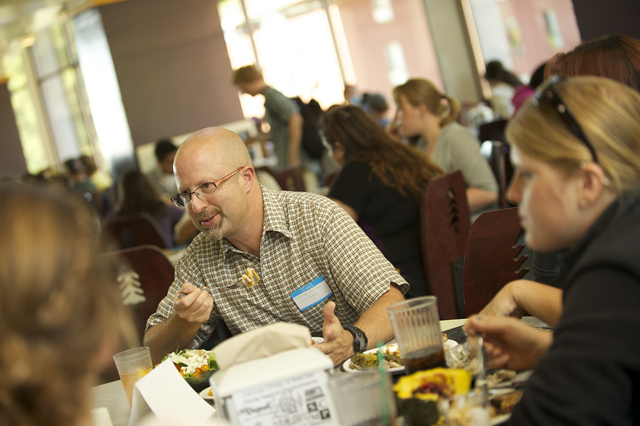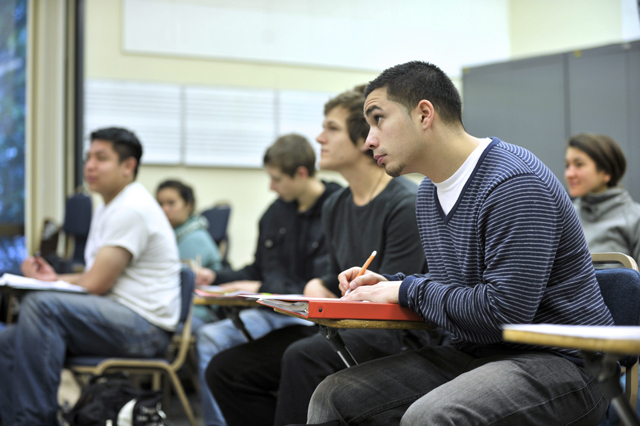The program, which uses peer instructors to boost student success in traditionally difficult science courses, also gave her peace of mind and a new perspective on learning.
“I realized I wasn’t the only one who was confused,” recalls Cueva, who is now a Zoology leader for the program. “My peers helped me see ideas in a light I hadn’t seen before, allowing me to really understand the topic.”
Offered through the Learning Center, supplemental instruction is one of several campus initiatives designed to boost student success and retention by providing academic and social support. The university recently added two new programs that help first-year students make the transition to college: a freshmen seminar started last year, and a residential advising program introduced this semester.
The Residential Academic Mentoring Program, or RAMP, automatically pairs incoming freshmen with an upper class student mentor who provides study skills and directs students to appropriate campus resources and services. The goal is to help freshmen better acclimate to the college experience through one-on-one counseling, says Residence Life coordinator Vynessa Ortiz. So far this semester, 575 students have participated, Ortiz says.

The university’s freshmen seminar introduced last year consists of a college transition course that touches on themes like community building, critical thinking, career and major exploration, financial literacy and wellness. The seminar is currently a pilot program and a staff and faculty working group is discussing ways to offer the program to all incoming students, says Jyoti Rawal, associate dean of student retention and success.
Supplemental instruction has grown significantly since starting at HSU in the mid-90s: the program served more than 700 students last year in introductory science courses like Botany, Biology and Chemistry, says HSU language skills specialist and supplemental instruction coordinator Donna Clark. This year, the program received $5,000 from the Humboldt Loyalty Fund (alumni gifts) to purchase scientific modeling kits that support hands-on learning.

Eighty-seven percent of those who completed the semester-long program passed with a grade of ‘C’ or higher, compared to 70 percent of those who didn’t. The results were even stronger among underrepresented minorities: 80 percent of program participants students passed, compared to 61 percent of those not participating.
“On the whole, participating students earn an entire letter grade higher than their non-participating counterparts, which is a pretty remarkable difference,” Clark says.
What makes the model unique is that it relies on student instructors instead of faculty to boost student retention. Twice a week, trained peer facilitators—students who previously took the course and excelled—discuss course material and learning strategies during a 50-minute group session.
“A leader might say, ‘I studied this number of hours, or ‘These are the strategies I used to get an ‘A’,” Clark explains. “The goal is to promote good study habits.”
It’s a particularly valuable service for incoming freshmen, Clark says, since many first-year students enter college unaccustomed to the amount of studying it takes to succeed.
“They’re coming from high school, where there’s a lot of handholding. In college, you have to be an independent learner and many students don’t know how to make that transition,” she notes.
That’s where student success initiatives can make a difference. The College of Natural Resources and Sciences started a similar program this semester called the 2:1 campaign, which uses a catchy logo on posters and stickers to promote better study habits. The campaign promotes the idea that in order to be successful, students should spend at least two hours studying for every one hour spent in class, says Dean Steve Smith.
“What we’re trying to do is send a visual reminder in computer labs and classrooms, that getting a degree in the sciences is hard work,” Smith says. “We want freshmen to take their studies seriously from the very beginning.”
For more information on supplemental instruction, visit www.humboldt.edu/learning/si. More on RAMP can be found by visiting http://www.humboldt.edu/reslife/ramp. More on HSU’s 2:1 campaign at http://www.humboldt.edu/cnrs/opportunities/study_tips .